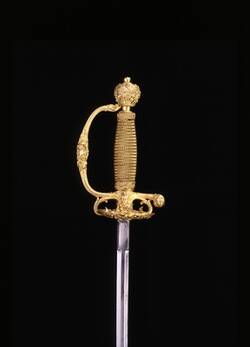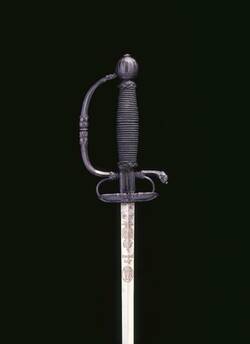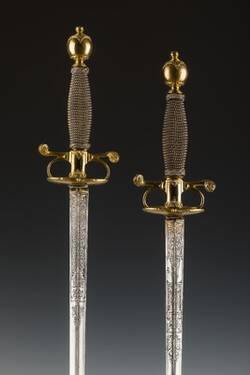August the Strong’s wardrobe, which was here at the Residenzschloss, not only stored his clothing, but also various weapons for daily use as well as dynastic or personal mementos. Among them were Swedish, Prussian, Danish and French "Felddegen" – military swords. After August the Strong’s death in 1733, the weapons were moved to the Armoury.
You can see a selection of these weapons here in the glass case. They were designed for August the Strong’s everyday use. This type of court sword had become established in around 1700 – it has a compact hilt and lightweight blade up to a metre or around three feet in length. The gilded brass hilts are either very plain or decorated with military motifs in relief. The increasing use of brass casting and the standardisation of hilt shapes are linked to the emergence of standing armies in the second half of the 17th century.
Take particular note of the delicate blackened mourning sword. It weighs all of 395 grammes – barely fourteen ounces. Its narrow blade, forged by the firm of Ziegler here in Dresden, bears the coat of arms of the Elector of Saxony and medallions with the king’s likeness.
Mourning swords were part of the strictly regulated protocol surrounding mourning. When a member of a princely dynasty or another European sovereign died, the king would order a period of court mourning. Its duration depended on the rank of the departed and the closeness of the connection. During this period, the king and members of the court dressed in black and carried swords with blackened iron hilts. In all, August the Strong kept four mourning swords in his wardrobe, but only this one has survived.
Further Media
- Location & Dating
- German. Pre 1733.
- Material & Technique
- Flattened diamond-shaped blade, etched, deeply blackened; Vessel brass cast, cut, profiled, punched, polished; Twisted brass wire handle wrap, partly braided, gilded.
- Dimenions
- Total length 1073 cm Blade 88.7 cm Blade width 2.6 cm Hilt width 12.9 cm Hilt depth 8.8 cm Weight 940 g
- Museum
- Rüstkammer
- Inventory number
- VIII 0018


